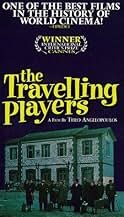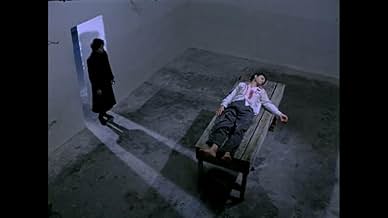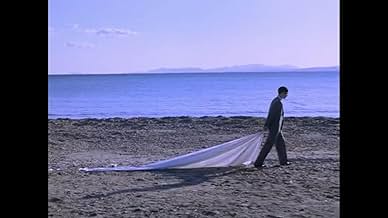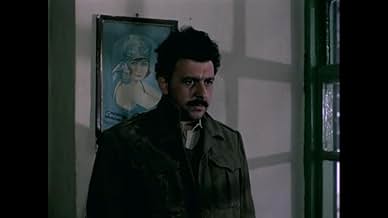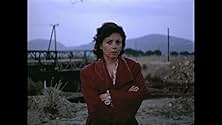IMDb RATING
7.8/10
4.6K
YOUR RATING
Greece, 1939-1952: Fascist, Nazi, and Communist conflict, as seen through the eyes of a family of travelling provincial players.Greece, 1939-1952: Fascist, Nazi, and Communist conflict, as seen through the eyes of a family of travelling provincial players.Greece, 1939-1952: Fascist, Nazi, and Communist conflict, as seen through the eyes of a family of travelling provincial players.
- Director
- Writer
- Stars
- Awards
- 12 wins & 2 nominations total
- Director
- Writer
- All cast & crew
- Production, box office & more at IMDbPro
Featured reviews
10iathanas
The Travelling Players is possibly the greatest movie in the history of Greek cinema. It is directed by the world-renowned Greek director Theo Angelopoulos and it presents the life in Greece from 1939 to 1952 through a family of travelling provincial players. It explores the political history of Greece during a very dramatic period, that includes dictatorship, the WWII outbreak, the Italian invasion and the subsequent German occupation and it continues with the liberation of the country and the very bloody Civil War.
The Travelling Players was a very controversial movie. The film was to participate officially in the Cannes Film Festival, but the conservative Greek government, sought (and failed) to prevent this to happen, because the film tells the modern Greek history through a left- Marxist perspective.
Angelopoulos proves that he's a master filmmaker on every level. From direction and writing to every technical aspect. Cinematography in particular.
Also, the music by Loukianos Kilaidonis is fantastic and elevates the film in a different level.
The Travelling Players is a masterpiece that everyone should watch.
The Travelling Players was a very controversial movie. The film was to participate officially in the Cannes Film Festival, but the conservative Greek government, sought (and failed) to prevent this to happen, because the film tells the modern Greek history through a left- Marxist perspective.
Angelopoulos proves that he's a master filmmaker on every level. From direction and writing to every technical aspect. Cinematography in particular.
Also, the music by Loukianos Kilaidonis is fantastic and elevates the film in a different level.
The Travelling Players is a masterpiece that everyone should watch.
This was a long Angelopoulos war movie...
Necessary to underline the long battle of the country to preserve its roots in a time of transition and also to show its slow resolve. In its first half the identity of the country stays in its actors that, during a war, are still trying to entertain with subversive messages but also make a living. They are the resistance, keeping the past alive through the folklore plays, keeping the culture alive in these times filled with turmoil.
Actors are like soldiers in the first half and are fighting the nazis with folklore ideology and metaphors. When one is captured or killed the ones that remain have to fight even harder, but still smartly, low-key. In the second half we have the same but the actors on the other side have changed, with different ideologies but who also want one thing - to eradicate the culture that was there originally and replace it by force with a foreign one. There were two forces who fought for the soul of Greece, the communists (Russia) and the imperialists (UK). All the while, its people, being split, are trying to keep the soul alive. Fundamentals of a war, after all.
All of these big-picture events have a small-picture effect on its citizens, the theatre troupe, in this case, where the changing of generations and mentality takes place...also by force.
It's a long one, one that has to interest you to keep you engaged because Theo's style are these sweeping shots, long takes, silent scenes where nothing much is happening but volumes are written about the meaning.
Necessary to underline the long battle of the country to preserve its roots in a time of transition and also to show its slow resolve. In its first half the identity of the country stays in its actors that, during a war, are still trying to entertain with subversive messages but also make a living. They are the resistance, keeping the past alive through the folklore plays, keeping the culture alive in these times filled with turmoil.
Actors are like soldiers in the first half and are fighting the nazis with folklore ideology and metaphors. When one is captured or killed the ones that remain have to fight even harder, but still smartly, low-key. In the second half we have the same but the actors on the other side have changed, with different ideologies but who also want one thing - to eradicate the culture that was there originally and replace it by force with a foreign one. There were two forces who fought for the soul of Greece, the communists (Russia) and the imperialists (UK). All the while, its people, being split, are trying to keep the soul alive. Fundamentals of a war, after all.
All of these big-picture events have a small-picture effect on its citizens, the theatre troupe, in this case, where the changing of generations and mentality takes place...also by force.
It's a long one, one that has to interest you to keep you engaged because Theo's style are these sweeping shots, long takes, silent scenes where nothing much is happening but volumes are written about the meaning.
This is a landmark film, a must see for anyone that wishes to understand modern Greek history and politics. The plot is a loose retelling of the Oresteia cycle of tragedies by Aeschylus--the names of the characters (Orestes, Electra, Chrysothemis) are an obvious hint. Betrayal, revenge and redemption are only part of the story. It takes place in Greece between 1936 and 1952, years filled with fascist dictatorship, war, Axis occupation, civil war and repression. Greece's traumatic history is seen through the eyes of a traveling company of actors, who travel all around provincial towns to perform a single play: "Golfo", a pastoral tragedy told in folk-song-inspired rhyming couplets.
This is not a movie for action-loving, short-attention-span viewers. Angelopoulos and his long-time collaborator, renowned cinematographer Arvanitis, have developed a very distinctive style, and "O Thiassos" is an uncompromising example. There are no close-ups, very little panning, some slow tracking; shots are long (both in point of view and time); almost every shot is filmed in overcast conditions; actors are dwarfed by their surroundings, which are all unglamorous, even depressing in their wartime run-down look. One could say that the purpose is to accentuate the tragic, the sense that the characters are cogs in the machine of history; but ancient tragedy did the same in big style, opulent costumes, and terrifying masks. Angelopoulos' politics induces him to focus on ordinary people in ordinary surroundings instead. The result is strangely, hauntingly lyrical to many; a real downer for some.
The film came out in 1975, a year after the end of the dictatorial right-wing regime of the "colonels" (1967-74), and after decades of repression of communists and their sympathisers. Angelopoulos' point of view is sympathetic to the left/communist side. Under full democracy, it was finally allowed to be expressed. The film helped shape the political sensibilities of a whole generation of Greek baby boomers. Its sixteen-year trek (plod, some would say) through Greek history will probably bewilder non-Greek viewers, but it is a deeply affecting crash-course in what shaped contemporary Greece. It is also an impressive re-interpretation of tragedy, as original as any I have seen on film.
This is not a movie for action-loving, short-attention-span viewers. Angelopoulos and his long-time collaborator, renowned cinematographer Arvanitis, have developed a very distinctive style, and "O Thiassos" is an uncompromising example. There are no close-ups, very little panning, some slow tracking; shots are long (both in point of view and time); almost every shot is filmed in overcast conditions; actors are dwarfed by their surroundings, which are all unglamorous, even depressing in their wartime run-down look. One could say that the purpose is to accentuate the tragic, the sense that the characters are cogs in the machine of history; but ancient tragedy did the same in big style, opulent costumes, and terrifying masks. Angelopoulos' politics induces him to focus on ordinary people in ordinary surroundings instead. The result is strangely, hauntingly lyrical to many; a real downer for some.
The film came out in 1975, a year after the end of the dictatorial right-wing regime of the "colonels" (1967-74), and after decades of repression of communists and their sympathisers. Angelopoulos' point of view is sympathetic to the left/communist side. Under full democracy, it was finally allowed to be expressed. The film helped shape the political sensibilities of a whole generation of Greek baby boomers. Its sixteen-year trek (plod, some would say) through Greek history will probably bewilder non-Greek viewers, but it is a deeply affecting crash-course in what shaped contemporary Greece. It is also an impressive re-interpretation of tragedy, as original as any I have seen on film.
"The Travelling Players", one of the early films of Theo Angelopoulos, shows the vast difference between the talented rising director of 1975 that had something to say, and of the bourgeois famous director of 1998 ("Eternity And A Day") that won the Cannes award but had nothing left to say.
A sprawling epic running at around 4 hours, the film follows a group of touring actors performing a theatrical play across Greece between 1939 and 1952. The focus is on the troubled modern history of Greece during the period (a fascist dictatorship, resistance against the Italians, German occupation, civil war), seen through a series of warped desolate sequences drenched in languor, and also an apotheosis of traditional folklore, music, theater, rural and urban landscapes. Most of these scenes exhibit a rare poetical sensibility, while a few are a bit clumsy, but still interesting.
Couple that with the drama that unfolds within the group of players, and you've got a true masterpiece. Basically what we see is a loose adaptation of Aeschylus' ancient tragedy "Oresteia" (the father Agamemnon, the adulterous mother Clytamnestra, her lover Aegisthus, the avenging daughter Elektra, the avenging son Orestes etc). In the end, the group of actors stands severely rearranged through a painful and dividing historical period, shadows of themselves in a shadow of a country. The film ends as a perfect circle just the way it began, a metaphor for life itself.
A sprawling epic running at around 4 hours, the film follows a group of touring actors performing a theatrical play across Greece between 1939 and 1952. The focus is on the troubled modern history of Greece during the period (a fascist dictatorship, resistance against the Italians, German occupation, civil war), seen through a series of warped desolate sequences drenched in languor, and also an apotheosis of traditional folklore, music, theater, rural and urban landscapes. Most of these scenes exhibit a rare poetical sensibility, while a few are a bit clumsy, but still interesting.
Couple that with the drama that unfolds within the group of players, and you've got a true masterpiece. Basically what we see is a loose adaptation of Aeschylus' ancient tragedy "Oresteia" (the father Agamemnon, the adulterous mother Clytamnestra, her lover Aegisthus, the avenging daughter Elektra, the avenging son Orestes etc). In the end, the group of actors stands severely rearranged through a painful and dividing historical period, shadows of themselves in a shadow of a country. The film ends as a perfect circle just the way it began, a metaphor for life itself.
A flawed masterpiece from Angelopoulos, the first of a number of great films of his you can pick at if you want.
First and foremost, it is a technical achievement; almost 4 hours and only about 80 cuts! It goes against all we've gotten used to in film story-telling, and does it brilliantly.
The story follows a troupe of actors back and forth through the years 1939 to 1952. They're thrown about by the violent, sometimes absurd tides of Greek history, with victory over the Nazi's giving way to the rise of local fascists at home.
The film is very Brechtian and distanced in style. We hardly get to know the characters at all, despite the running time. It's much more interested in the great tides of politics and time than individuals - which is both its strength and its weakness. I was always interested, sometimes horrified, but rarely touched emotionally. Also, some of the good/bad of the politics felt simplistic.
That said, despite its length, I will re-watch it. I suspect I'll appreciate the amazing scope of it's vision and the bravery of it's style even more without expecting to get caught up in the people in a conventional way.
If you have the chance, get ahold of the 'New Star' DVD, which was only in release a short time. The transfer was supervised and approved by Angelopoulos, and certainly looks wildly better than the commonly found VHS tape.
First and foremost, it is a technical achievement; almost 4 hours and only about 80 cuts! It goes against all we've gotten used to in film story-telling, and does it brilliantly.
The story follows a troupe of actors back and forth through the years 1939 to 1952. They're thrown about by the violent, sometimes absurd tides of Greek history, with victory over the Nazi's giving way to the rise of local fascists at home.
The film is very Brechtian and distanced in style. We hardly get to know the characters at all, despite the running time. It's much more interested in the great tides of politics and time than individuals - which is both its strength and its weakness. I was always interested, sometimes horrified, but rarely touched emotionally. Also, some of the good/bad of the politics felt simplistic.
That said, despite its length, I will re-watch it. I suspect I'll appreciate the amazing scope of it's vision and the bravery of it's style even more without expecting to get caught up in the people in a conventional way.
If you have the chance, get ahold of the 'New Star' DVD, which was only in release a short time. The transfer was supervised and approved by Angelopoulos, and certainly looks wildly better than the commonly found VHS tape.
Did you know
- TriviaThe whole film is accomplished in around 80 shots.
- Quotes
Elektra's Father: [before he is executed by the Germans] I came cross the sea, from Ionia. Where did you come from?
- How long is The Travelling Players?Powered by Alexa
Details
- Release date
- Country of origin
- Languages
- Also known as
- The Travelling Players
- Filming locations
- Production company
- See more company credits at IMDbPro
Contribute to this page
Suggest an edit or add missing content


